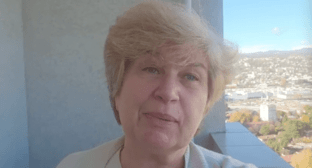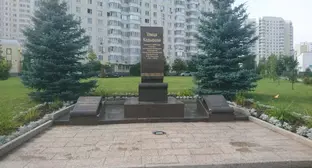22 May 2004, 20:52
Camps dismantled - new 'smokescreen' for human rights advocates
April 1 is the deadline the authorities set for dismantling the Sputnik camp, one of the last Chechen refugee camps in Ingushetia.
"The tenants of the camp were notified of the forthcoming closedown as far back as in mid-March. Compulsion or pressure on refugees is out of the question, as we work only with those who have expressed a wish to return to their homeland," Akhmed Zaurbekov, a representative of Chechnya's Governmental Committee on Forced Migrants Affairs and Compensations, says. All conditions necessary for normal life are being provided for those people in Chechnya, according to Zaurbekov, including a priority scheme for payment of compensations, rooms at temporary accommodation points in Grozny and financial assistance for hiring accommodation in the private sector. Those who want to stay in Ingushetia are also allocated alternative housing in compact residence places in the republic.
However, refugees make no haste to leave the camp, which in turn prompts the authorities to step up measures to press them out. One such intimidation action was taken on March 28 this year when additional police force was moved to the Sputnik camp apart from the one quartered there on a temporary basis.
Thick puffs of smoke were the first thing to catch the eye at the exit to the Sputnik camp. Representatives of the Federal Migration Service of the Russian Internal Affairs Ministry, with crisis management chief Ivan Pomeshchenko at the helm, were personally, oddly enough, "conducting disposal of household garbage" which stayed after the dismantling of some tents. "Apparently, they've simply decided to smoke us out of here like bees," camp dwellers joke about it. "You see, don't you, it's actually impossible to breathe here?" The fact that fire was arranged at a dangerously short distance from tents caused people even greater worries. "Well, tents - they are like paper, get burnt in seconds," Vakhid Akhmadov, resident in Sputnik, complains. "When I told Pomeshchenko about that, but he replied it was high time to burn all the remaining tents along with their tenants."
About thirty people in police uniforms got off on the camp premises early in the morning on Monday. Apparently, from the very beginning they were intended to be a kind of "decoration." It should be noted the policemen did not interfere in the situation in any way during the entire day. Yet the strange circumstance, coinciding with big numbers of heavy vehicles driven here, caused strong panic among camp dwellers. People thought the authorities had made up their mind to implement their recent threats to use force and deport them to Chechnya against their will.
About sixty tents are still in the camp as of March 29 in which more than five hundred internally displaced people live, according to the Migration Affairs Authority for Ingushetia's Sunzha district. Most of these people plan to return to their homeland, but they make no haste to do that for some or other reasons. Some of them are waiting for the notifications of compensation which they were promised, while others try to obtain pre-cast panel cabins allocated by the Office of the UN High Commissioner for Refugees (UNHCR). Refugees would like to settle all those matters before going to Chechnya, because they are afraid it will be very difficult to obtain any assistance from the authorities upon arrival. "The authorities are ready to promise you the moon as long as you are in Ingushetia, but when you are coming to the place, no one cares about you," Amzan Tarkhanova says. "My house was razed to the ground, I have just nowhere to go. Well, I've lodged a request for a panel cabin the other day and I'll go as soon as I get it. However, police have said today they are not going to wait any longer, so the remaining refugees will be removed from the camp to Chechnya by force."
A lot of problems are connected with people's resettlement to compact residence places in Ingushetia, too. Refugees complain that living conditions are extremely cramped there: five to seven people are accommodated in a room which is half the size of a tent. In addition, the future of these small communities is quite uncertain. When refugee camps are dismantled, the authorities are quite likely to tackle compact residence places, especially because electricity and gas cuts have happened more than once here already.
However, the camp is to be closed on April 1 as ordered by Igor Yunash, first deputy chief of Russia's Federal Migration Service. Representatives of the agencies involved in this work are doing everything possible and impossible.
First communities of Chechen refugees emerged in Ingushetia in May 1999 when a huge flow of refugees that fled the impending war flooded the neighboring republic. The majority of people, mostly residents of the three settlements adjacent to Ingushetia - Samashki, Sernovodsk and Assinovskaia - gathered on the border with Ingushetia which was still officially closed that time. Thousands of Chechens, mostly women, children and old people spent first several days in the open air. There was a disastrous shortage of canvas tents pitched right on the spot, on bare ground. That time, thanks to personal interference of Ingushetia's former president Ruslan Aushev and financial support of the UNHCR, spontaneous communities of Chechen refugees on the border were moved to Ingushetia. Thus, Ingushetia's first and largest camp of Chechen refugees, Sputnik, emerged on the outskirts of Orjonikidzevskaia, Sunzha district, two kilometers away from the administrative border with Chechnya. Once, about ten thousand people lived in it, according to the Migration Affairs Authority of Ingushetia's Internal Affairs Ministry.
As military action was being stepped up in Chechnya, the flow of refugees to the neighboring republic was growing, along with the number of refugee camps in Ingushetia. Six biggest camps of internally displaced people were established in various districts of the republic by 2000, which numbered a total of more than thirty thousand refugees. The Sputnik camp in Ingushetia's Orjonikidzevskaia emerged in 1999. A little more than one hundred and fifty tents remained as of mid-March out of the six hundred tents pitched in the camp in early 2000, according to the deputy warden of the camp.
At first, because there was no free access to the military action area, refugee camps served as the only source of information about developments in Chechnya. It is quite clear that, being the subject of close attention on the part of international observers and journalists, they created an unfavorable background for the federal center's policy in Chechnya.
The authorities started to make attempts to drive refugees out of refugee camps to Chechnya practically as soon as the camps emerged, and they stepped up these measures every time some important events in the nation's political life were outlined. The most recent mass return of refugees to Chechnya was scheduled for early March this year. As far back as at the beginning of the year, the more than twenty people engaged in having internally displaced persons back in Chechnya launched their work in refugee camps. Every day, representatives of the Migration Affairs Authority of Chechnya's Internal Affairs Ministry, the Committee for the Payment of Compensations, the passport and visa service at Chechnya's Internal Affairs Ministry, the Governmental Committee on Forced Migrants Affairs, district heads of administration and members of Chechnya's State Council began their working day with a tent-to-tent round. They "explained" to the people that the camp would be closed by the end of the month and suggested that they should decide on what they chose.
Simultaneously, there were periodic cuts of electricity, gas and water in refugee residence places and interruptions in humanitarian aid supplies; people were disqualified as forced migrants without any grounds. Thus, in spite of numerous protests and alarming signals from local human rights advocates, the Bart camp in Karabulak was closed down hastily by early March. By the way, Ella Pamfilova, chair of the Commission on Human Rights for the Russian president, has also repeatedly said that the process of refugees' return to Chechnya must not be forcibly accelerated.
Two refugee camps are still in Ingushetia at the moment, with the estimated total population of two thousand to two thousand five hundred internally displaced people from Chechnya; besides, there are about one hundred compact refugee communities. "More than forty-five thousand internally displaced people from Chechnya lived in Ingushetia until recently, according to our information. About four thousand of them lived in refugee camps, twenty thousand in the private sector and more than twenty thousand in compact communities," an officer of the Migration Affairs Department of Ingushetia's Internal Affairs Ministry says. "There are currently more than four hundred tents in the Satsita and Sputnik camps in which more than two thousand people live. It should be taken into account though, that these figures are constantly changing downwards, as several families of internally displaced people leave the republic every day."
During his last trip to Ingushetia, Igor Yunash, deputy head of the Federal Migration Service, observed that "the changing socio-political situation in the Chechen Republic" was one of the main reasons for the acceleration of the process of refugees' return to Chechnya. "The process of people's return has presently noticeably accelerated. A number of factors have contributed to that, including the changing socio-political situation in the Chechen Republic and creation of legitimate government institutions. If people were afraid to go there, they would not go there for any money, any compensations," he said.
Meanwhile, in spite of all assurances given by the authorities that this work is carried out solely considering the interests of internally displaced people themselves, human rights advocates and representatives of international nongovernmental organizations working in Ingushetia have indicated the fact that attempts to accelerate the process of refugees' return to Chechnya more and more often go along with numerous violations of their rights.
"To my mind, a certain trend towards refugees' return to Chechnya can really be traced. However, this is more likely to indicate purposeful worsening of the condition of refugees in temporary residence places in Ingushetia rather than any 'improvement of the socio-political situation' in Chechnya. Pressure has systematically been put on refugees over the past few months, which was expressed in constant threats, blackmail and intimidation. The special operation conducted in the Satsita camp on March 6 is an obvious confirmation of that. This was a sort of psychological terror that had the only aim - to make people leave refugee camps; as we can see, they were in part a success," Ruslan Badalov, head of the Chechen Committee of National Salvation regional public movement, says.
The government has long transformed the issue of dismantling the camps from a social problem into a political one, in the opinion of analysts. "The main and most important reason that makes the government take such resolute steps is their attempt to legitimize the processes going on in Chechnya. The presence of a huge number of refugees in the neighboring territory, which is indisputable evidence of ongoing instability in Chechnya, is much too strong a blow to the authority of the local government. If Chechnya's citizens refuse to go back to the republic after all those 'positive things' the Chechen leadership has done, there are reasons to believe that the situation in Chechnya continues to be strained in spite of all encouraging statements by the government," Murad Magomadov, a Chechen analyst and political scientist, believes.
Local human rights advocates forecast that Satsita, the last refugee camp in Ingushetia, will be wiped out by early May in a similar way. At the same time, they do not rule out that this occurrence can become the beginning of a new attack of the government on the places of compact residence of Chechen refugees in Ingushetia.
March-April 2004
Author: Malika Suleymanova, CK correspondent Source: Caucasian Knot




